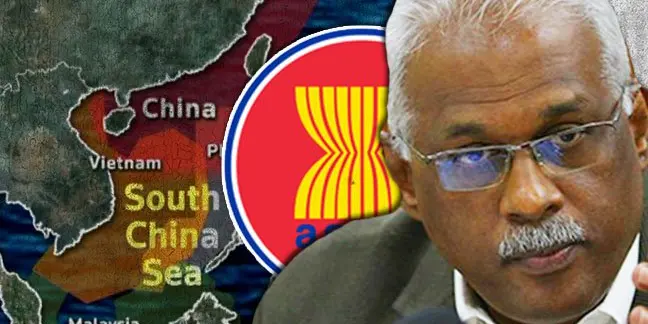
South China Sea: ASEAN proven yet again to be ‘spineless’
July 29, 2016

By Charles Santiago
APHR Chairperson
MP, Malaysia
It’s nothing new, really. But we can once again call Asean the toothless tiger. Or the spineless regional bloc. And all of the insults hurled at the 10-member grouping would make perfect sense.
Just after 24 hours of meetings, Asean ignored the ruling by the Permanent Court of Arbitration (PCA), which dismissed China’s claim of historical rights over the South China Sea.
Foreign Ministers skirted around the international tribunal’s ruling by saying they were committed to resolving regional disputes through “legal and diplomatic processes, without resorting to the threat or use of force.
The crux of the high drama was when the Philippines, the country that challenged Chinese encroachment of its territory in the first place, balked in Vientiane by withdrawing specific mention of the PCA ruling. And that too barely two weeks after having secured a slam-dunk victory over its claim against China.
This means that any reference to the judgement has no legal basis and will not find its way to the final declaration adopted by Asean Foreign Ministers, despite China violating the sovereignty of the Philippines.
And now Asean Foreign Ministers call the less-stinging communique, drummed out after tedious work to narrow differences between the ten countries, a success despite shamelessly selling out to the Chinese.
The political U-turn raises crucial questions.
Could it be possible that the Philippines did not want to upset super-power China or felt compelled to ensure Aslan unity? Or was it bought out in favour of economic gains in the near future?
Others in Asean have acquiesced to Chinese largess.
The Cambodians were handsomely rewarded to the tune of USD600 million by the Chinese immediately after blocking the recent Asean statement. China is Cambodia’s largest trading partner.
Clearly China, which nonchalantly dismissed the ruling as “a piece of waste paper”, won and got what it wanted.
But what now for Asean unity, especially after its watered-down rebuke despite the fact that some of its members are victims of China’s bullying?
The ten-member bloc has sticking points that are yet to be ironed out, questioning the very existence of e Asean unity.
In 2012, Cambodia, then Asean Chair, showed absolute loyalty to China by blocking an Asean Foreign Minister’s statement critical of China’s encroachment of disputed areas in the South China Sea. In fact, this was the first time in the 49-year-history of Asean, that there was no formal statement from its top regional diplomats.
The regional grouping was confronted with a similar embarrassing moment at the Asean-China Foreign Ministers’ meeting in Kunming, China last month. Cambodia and Laos again blocked a strongly worded Asean agreement critical of China’s aggressive expansion of disputed areas in the South China Sea. The disagreement was on China building military installations in disputed areas in the South China Sea.
Analysts believe Cambodia’s excessive dependence on China has influenced Cambodian foreign policy and placed it firmly under China’s influence.
Cambodia and to a lesser extent Laos’s role in protecting China’s geo-political and strategic interests is the single most important reason dividing the region. And given Asean’s consensus decision-making process, it has rendered the ten-country regional bloc irrelevant vis-à-vis China’s aggression in the South China Sea.
Thus the take away message from the fiasco in Vientiane to the fifty-year-old Asean is that it has violated the very principle it was established to promote and protect – a zone of peace and neutrality.
Clearly, China is the cause of growing disunity in the region. Its crafty approaches include the use of military dominance, diplomatic offensives and money power to pursue its interests and assert control of the region.
Asean’s diplomatic limbo is striking, given that it is unable to speak with one voice on an issue that has serious sovereignty, territorial and economic ramifications for its member states.
Ignoring the PCA judgment sends the wrong message to the international community that Asean is not united in respecting and adhering to rules based on an international order and rule of law.
And worse, an Asean that claims to be committed to notions of stability, regional cooperation and neutrality is unable to stand up to China’s aggression.
Asean nations have to now play by Chinese rules.
This would mean that future negotiations on contested areas would be premised on bilateral negotiations, ostensibly favouring China as opposed to the PCA ruling which supports claims by Asean countries.
China’s sway in the region promises to increase as more Asean nations increasingly depend on China’s largesse.
For example, China has come to the rescue of Malaysian Prime Minister, Najib Razak, by bailing out companies linked to the scandal-hit sovereign fund 1Malaysia Development Berhad.
And more Chinese investments are heading to Malaysia.
So it appears like the Vientiane high drama is here to stay given that more Asean partner-nations are increasingly addicted and dependent on Chinese money.
This article originally appeared in Free Malaysia Today.
ASEAN Parliamentarians for Human Rights (APHR) was founded in June 2013 with the objective of promoting democracy and human rights across Southeast Asia. Our founding members include many of the region's most progressive Members of Parliament (MPs), with a proven track record of human rights advocacy work.